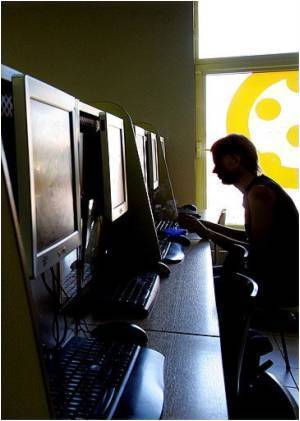A middle-aged man with a balding pate and wispy white goatee greets people walking by with a constant refrain outside a harmless-looking two-storey terrace house.

The tout says more than 50 customers patronise his business daily.
"Our customers are international, anybody can come as long as they can pay," he says, brushing aside a reporter's suggestion that the police might not approve of his operation.
"We're legal!" he scoffs loudly.
Despite its prudish reputation -- the government still bans magazines like Playboy and Penthouse -- Singapore allows prostitution to thrive in strictly designated areas, and Geylang is the largest and most famous.
Brothels operating out of houses -- one calls itself "Heaven on Earth" -- operate in the district alongside budget hotels, sidewalk cafes, community associations and even Buddhist temples.
Despite the presence of legal prostitution, foreign women on short-term visitor passes also ply their trade on the streets and lanes of Geylang, and there seems to be enough business for everyone.
More than a fifth of the island state's population of five million are foreigners, the majority of them blue-collar and manual workers.
And one million tourists a month now visit Singapore thanks to a booming casino industry.
The local sex trade came under the spotlight in June last year when the US State Department downgraded Singapore in its Trafficking in Persons (TIP) report.
The report said some women from China, the Philippines and Thailand were tricked into coming to the city-state with promises of legitimate employment and then coerced into the sex trade after arrival.
Singapore authorities issued an indignant reply, saying their efforts to curb trafficking had not slackened and asking the US government to look at its own immigration record before commenting on other countries' situations.
In Geylang's licensed brothels, customers pay an average of Sg$50 ($38) for sex inside cramped cubicles, according to operators who spoke on condition of anonymity.
Their primary customers are the masses of testosterone-driven guest workers from China, Bangladesh and Southeast Asia.
Business is best on weekends when hordes of foreign men on their day off throng its narrow lanes looking for fun.
Like other businesses in Singapore, the sex trade has clear rules.
Brothels can only hire Malaysian, Thai and Chinese girls between the ages of 21 and 27, said one tout.
Prostitutes are also required to make customers wear condoms and report for monthly medical check-ups, he added.
Streetwalker Dan Dan, a Beijing native who refused to disclose her real name, said an increased presence of plainclothes police was deterring customers from taking up her 100-dollar "guaranteed good" service.
Foreign women like Dan Dan who work freelance in the sex trade and bring customers to motel rooms cannot be arrested unless they are caught offering their services out in the street, or violate immigration and other laws.
For a first offence, Dan Dan faces a fine of up to Sg$1,000 if she is caught soliciting in public, with subsequent convictions carrying higher fines and potential jail terms.
But Dan Dan, who has been working Geylang's alleys since she came to Singapore three months ago, said she was willing to brave the consequences.
"The money's good on busy days," she said.
Local women's rights activist Braema Mathi advocates protection of prostitutes in Singapore and closer regulation of the industry.
"All we want is for the women to be protected and not judge them for the work that they have decided to take on," she told AFP.
"We believe that one of the better ways to protect women is to ensure that they work in licensed brothels, where there is a fee structure and condoms," Mathi added.
"This way the women can be protected from exploitation and from succumbing to diseases."
With a regulated sex industry, Singapore authorities can turn their attention to women forced into prostitution, she said.
"We see more women in the trade and definitely not all of them are willing."
Source-AFP










